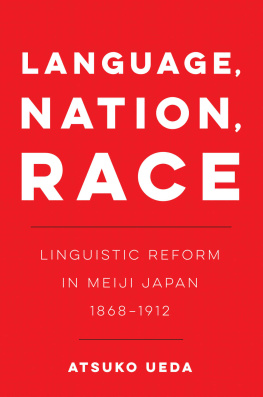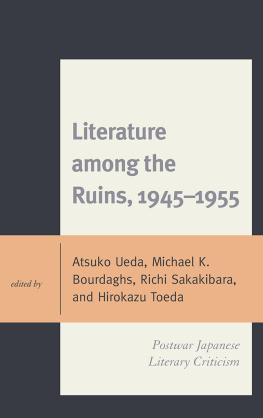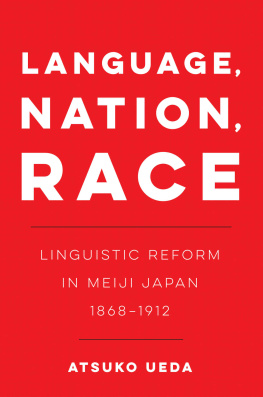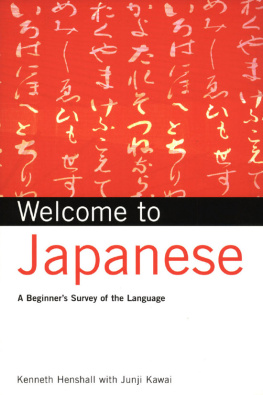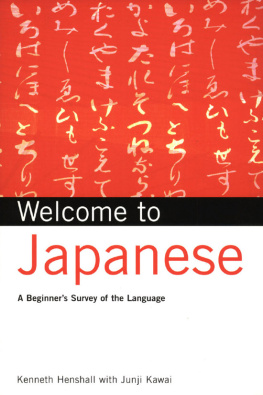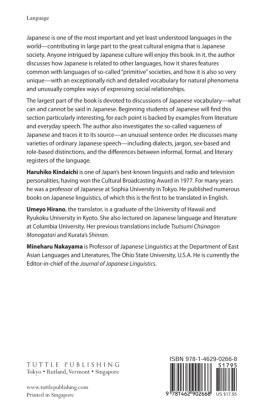Luminos is the Open Access monograph publishing program from UC Press. Luminos provides a framework for preserving and reinvigorating monograph publishing for the future and increases the reach and visibility of important scholarly work. Titles published in the UC Press Luminos model are published with the same high standards for selection, peer review, production, and marketing as those in our traditional program. www.luminosoa.org
NEW INTERVENTIONS IN JAPANESE STUDIES
General Editor
Sabine Frhstck, University of California, Santa Barbara
Editorial Board
Daniel Botsman, Yale University
Michael K. Bourdaghs, University of Chicago
David L. Howell, Harvard University
Susan Blakeley Klein, University of California, Irvine
Fabio Rambelli, University of California, Santa Barbara
Jennifer Robertson, University of Michigan, Ann Arbor
Julia Adeney Thomas, University of Notre Dame
Gennifer Weisenfeld, Duke University
Language, Nation, Race: Linguistic Reform in Meiji Japan (1868 1912) , by Atsuko Ueda
A Proximate Remove: Queering Intimacy and Loss in the Tale of Genji , by Reginald Jackson
Language, Nation, Race
Language, Nation, Race
Linguistic Reform in Meiji Japan (18681912)

Atsuko Ueda

UNIVERSITY OF CALIFORNIA PRESS
University of California Press
Oakland, California
2021 by Atsuko Ueda
This work is licensed under a Creative Commons CC BY license.
To view a copy of the license, visit http://creativecommons.org/licenses .
Suggested citation: Ueda, A. Language, Nation, Race: Linguistic Reform in Meiji Japan (1868 1912) . Oakland: University of California Press, 2021. DOI: https://doi.org/10.1525/luminos.103
Library of Congress Cataloging-in-Publication Data
Names: Ueda, Atsuko, author.
Title: Language, nation, race : linguistic reform in Meiji Japan (1868 1912) / Atsuko Ueda.
Description: Oakland, California : University of California Press, [2021] | Includes bibliographical references and index.
Identifiers: LCCN 2020046901 (print) | LCCN 2020046902 (ebook) | ISBN 9780520381711 (paperback) | ISBN 9780520381728 (ebook)
Subjects: LCSH: Japanese language ReformMeiji period, 18681912. | Language policy JapanMeiji period, 18681912. | Nationalism Japan Meiji period, 18681912. | JapanRace relationsMeiji period, 1868 1912.
Classification: LCC PL525.6.U34 2021 (print) | LCC PL525.6 (ebook) | DDC 306.44/952 dc23
LC record available at https://lccn.loc.gov/2020046901
LC ebook record available at https://lccn.loc.gov/2020046902
Manufactured in the United States of America
28 27 26 25 24 23 22 21
10 9 8 7 6 5 4 3 2 1
For Naoharu and Yasuko Ueda
CONTENTS
ACKNOWLEDGMENTS
I finally get to thank the many people who have supported me in various ways throughout this project. Among my colleagues at Princeton, present and past, who have given me not only a great intellectual community but also pleasurable company throughout the years, I thank Eduardo Cadava, Ksenia Chizhova, Steve Chung, Ben Elman, David Howell, Erin Huang, Paize Keulemans, David Leheny, Federico Marcon, Susan Naquin, Willard Peterson, Franz Prichard, Anna Shields, and Brian Steinenger. Im particularly grateful to Joowon Suh for her continued friendship and support over many years. I thank Setsuko Noguchi, a friend and librarian without whom this work could not have been completed. Many of my former and current students engaged with my ideas on which this book is based: David Boyd, Will Bridges, Junnan Chen, Miyabi Goto, Claire Kaup, Jessica LeGare, Qinyuan Lei, Bernard Shee, Tomoko Slutsky, Ajjana Thairungroj, and Ron Wilson. I also thank Joseph Henares for his help in compiling the bibliography.
My mentorsBrett de Bary, Ken Ito, and Mizumura Minaehave supported me for many years. Formal and informal conversations with many colleagues were essential in bringing this project to fruition. I especially thank the many close friends in my field who have brought intellectual inspiration along with their capacity to drink pleasurably: Michael Bourdaghs, Rich Calichman, Jim Dorsey, Mayumo Inoue, Thomas LaMarre, Michele Mason, Simone Mller, Doug Slaymaker, Toba Koji, and Toeda Hirokazu. In addition to being great company, I also thank Pedro Erber for his incisive comments on my manuscript. I am also grateful to Richi Sakakibara not only for being a long-term friend but also for sharing with me the desire to continually think about what constitutes Japan and the Japanese language. I thank Jim Reichert for his professional support and for visiting New York when possible to continue our Michigan reunion.
An earlier version of has also appeared as Bungakuron and Literature in the Making, Japan Forum 20, no. 1 (March, 2008).
I am grateful to Reed Malcolm at the University of California Press for his enthusiasm and encouragement. I also thank Archna Patel and Enrique Ochoa-Kaup for shepherding this manuscript through. Additionally, I thank one anonymous reviewer, whose comments were extremely helpful in revising the manuscript.
Oddly enough, I feel that there is a strong affinity between this project and my family. In many ways, it is precisely how my parents raised me that shaped my interest in Japanese language, national community, and race. As difficult as it was growing up in different countries and being educated in multiple languages, that experience was essential for me to critically engage with Japan, nationalism, and linguistic modernity. I thank my sister, Tomoko, for sharing the experience with me, and for all the emotional and material support she has given me throughout the years. And I am immensely grateful to my parents, Naoharu and Yasuko Ueda, for raising me the way they did and for all the support they have continued to give me. This book is dedicated to them.
Introduction
This book is about a variety of language reforms that occured in Meiji Japan (18681912). It is certainly not at all comprehensive, but is rather an attempt to intervene in the vast scholarship of language reform that has defined the past two decades. In thinking about linguistic reforms, it is of course vital that we consider issues of nation formation, as many scholars have done in the past. Lee Yeounsuk, Komori Yichi, Yasuda Toshiaki, and Osa Shizue all published works in the 1990s and beyond, and to this day their works define the field of language reform.
The trend of postcolonial and cultural studies, accompanied by various studies of imperialism and nationalism, is worthy of reflection, as it extends far beyond the scholarship of Meiji language reform. As early as 2000, scholars such as Harry Harootunian issued an apt warning regarding the link between postcolonialism and area studies. In his Historys Disquiet , Harootunian discusses the trap of postcolonial theory as follows:
Postcolonial theorys promise to supply a critique of Eurocentric conceptions of knowledge and provide a forum for the hitherto excluded to speak in their own voice from the margins where domination and power had held them silent since the beginning of modernity now reread as colonialismstands as the true successor of area studies, which can be seen as their prehistory. Yet the search for the excluded voice often leads to the futile pursuit of authenticity and restores the Eurocentric claims of the sovereign subject it wishes to eliminate.
Elsewhere, he also states:
Rather this obsessive Foucauldianism has often found power everywhere, as well as an opportunity for resistance everywhere. Too often this has resulted in lavish declarations of resistance by the powerless and weak.... Sometimes, the mere enunciation of cultural difference and thus the claim of identity is made to appear as an important political act when it usually signals the disappearance of politics. The politics of identity based on the enunciation of cultural difference is not the same as political identity whose formation depends less on declarations of differences than on some recognition of equivalencies.
Next page
